
An interdisciplinary collaboration with a group of musicians from the Canary Islands has resulted in an album release that Northeastern Music Industry students contributed to in incredibly meaningful ways. The group, Simbeque, spent three days on campus last fall, recording tracks for this new album, Simbeque—Volume II, in Shillman Media Studios, as well as teaching a master class and performing a concert at Northeastern’s Fenway Center. This residency allowed students to learn from and work with internationally renowned musicians in multiple formats, collaborating and sparking important dialogue about a musical culture that seldom leaves the region and is rarely discussed or explored in the United States.
The collaboration between Simbeque and Northeastern was spearheaded by Mark Lomanno, Department of Music Visiting Assistant Professor of Ethnomusicology, Jazz Studies, and Music Industry. As a doctoral candidate nearly ten years ago, he began studying Canary Islands’ traditional culture and the current music scene there, including members of Simbeque, as part of his dissertation research. He eventually spent a year performing and conducting archival and ethnographic research there, where he was welcomed into these musicians’ homes and established the long-standing relationships with the group he still continues to foster today.
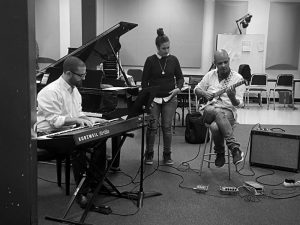
“For me research, performance, and teaching all go hand-in-hand. When I was an undergraduate myself, I had professors who opened my eyes to new cultures, including me on international conferences and performance, which were formative experiences. Those are the kinds of opportunities I’ve been working to provide for my students here; and to introduce them to these distinguished musicians is incredibly gratifying,” Professor Lomanno explained. “One aspect of our Music program I have always loved is that we are constantly trying to give students real-world experience, and this residency presented so many opportunities for this type of interdisciplinary and experiential learning.”
With the support of the Music Department, African American Institute, and the Department of Cultures, Societies, and Global Studies, these unique learning experiences started with a presentation on traditional Canarian music in Professor Lomanno’s Jazz course (MUSC 1112), which was a great way for a large group of students to learn, first-hand, from experienced musicians. This lecture was followed by the Shillman Media Studio recording session on the musicians’ second day on-campus. Recording professor Jim Anderson, who recently retired this spring, supervised Music Industry students Cairo Marques-Neto ‘19 and Paul Kouris ’18 in working with Simbeque on tracks for its second album, Simbeque—Volume II. While the group’s first album (released in 2015) focused on a theme of roots, and the recordings concentrating on the Canary Islands, the second volume that Northeastern students worked on took a more global approach. The album features collaborations from around the world – Northeastern University being just one of them.
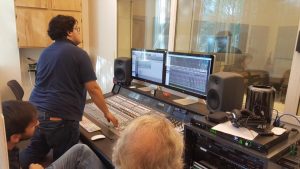
The group’s three-day visit culminated in a concert at the Fenway Center, which was run by students from Green Line Records, Northeastern’s student-run record label. This was a perfect opportunity for students to see how the professional process unfolds before, during, and after a concert. And to have the opportunity to manage the performance of world-class musicians made the whole experience that much more special.
“As a group, we had three days to go from our first rehearsal to that recording session and concert. Even though I’ve known these musicians for years, it was the first time that particular ensemble had ever performed that repertoire. Cultivating that type of preparedness and flexibility in real-world situations is a hallmark of our music programs,” Professor Lomanno said.
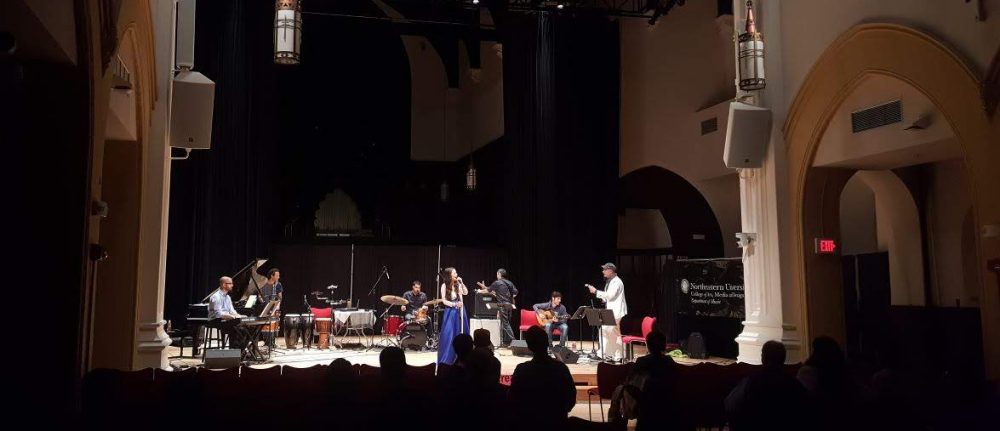
The Simbeque project is especially unique in that it allows its musicians – who all have diverse local, national, and international experience – to communicate ideas about contemporary Canarian society as Afro-diasporic, indigenous, and transcultural in ways that unite audiences and foster dialogue that can be contentious in other venues. This exploration of music as a dynamic, fluid, and collaborative form of expression has helped Simbeque earn its place in the center of the current Canarian music scene – and is also the crux of Professor Lomanno’s ethnographic research. The need for it stems from the Canary Islands’ rich, often overlooked history that continues to impact the culture today, more than five-hundred years after the land was colonized by Spain in 1496, a conquest that began in 1402.
As with most conquests throughout history, in this instance, the clash of Spanish rule with indigenous people and their traditions, and a physical location off the coast of northwestern Africa, has caused ripples through the Islands’ governance, politics, and more. In this type of politically-charged climate, where speech can be inflammatory, music brings a certain amount of interpretative license and aesthetic interest to messages that make it an ideal form of communication. It is one of many examples of how music can affect—and even anticipate—social change.
“Simbeque takes traditional music, which can be viewed as an antiquated and amateur musical genre, and updates it,” said Professor Lomanno. “The newest volume, which our students worked on, is a jazz record, with intricate arrangements and developed harmonies – but what they’re actually playing at its core is traditional music from the Canary Islands that locals would recognize. The group is innovating this traditional music in exciting and socially important ways.”
According to Lomanno, one of the ways Simbeque does this, in both of its albums, is by embracing the diverse musical cultures that influence Canarian culture, including African American and U.S. jazz, Latin America and the Caribbean, North African and Amazigh singing styles, as well as indigenous Canarian musical expression. While this may seem like a straightforward approach, this multilayered approach to musical culture is socially and politically progressive in the Canarian archipelago.
Having the opportunity to share this background and experiences with the students at Northeastern was meaningful for Simbeque, and it opened up a new world of music and history for many people here.
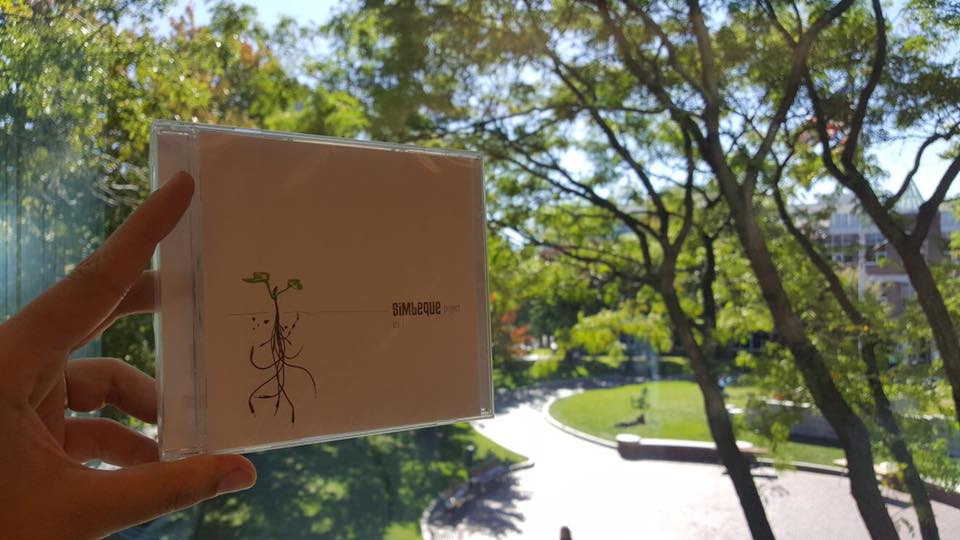
“In the Northeastern Music Industry program, it’s not just about teaching students the skills they need to succeed, it’s also about encouraging them to dig deeper—to change the paradigm of success so that it includes thinking critically and ethically about their creative work and the impacts it has on their collaborators and the industry more widely. The residency was a learning experience for everyone involved – the students, faculty, and musicians themselves,” Professor Lomanno concluded. “To have hosted them means a great deal to me as an ethnomusicologist and educator; and to have the support of the Music Department and the wider University community to provide them this platform in collaboration with our students is inspiring.”
Fortunately, there are ways this relationship will develop in the future. In the short-term, the leader of Simbeque, guitarist Miguel Manescau, has invited Professor Lomanno back to the Islands to perform concerts and lead a master class in May 2019. In the longer-term, we look forward to maintaining a two-way dialogue with this group and more of Lomanno’s Canarian interlocutors, and continuing to find ways to collaborate and bring valuable learning experiences to our students.
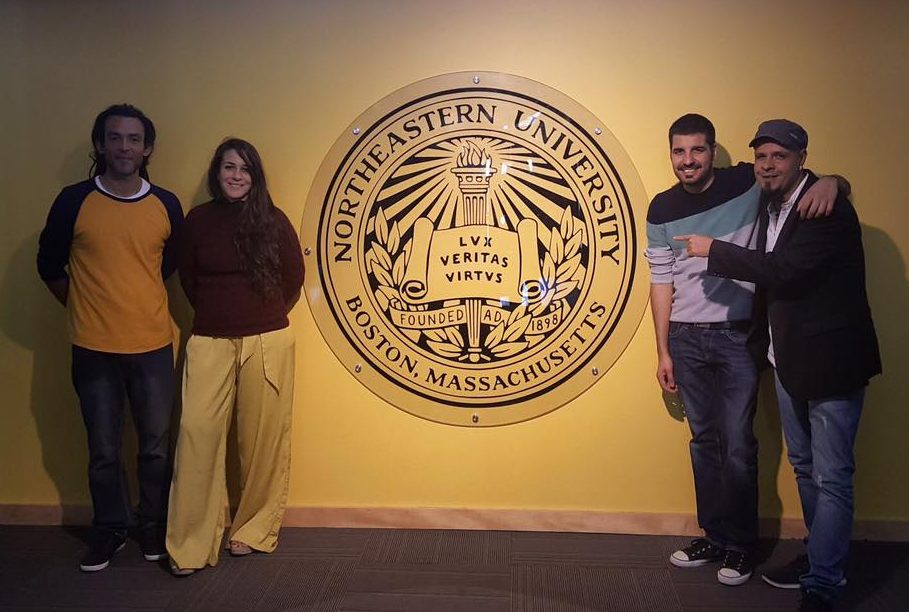
All photos in this article are courtesy of Ana Hernández Grillo.

